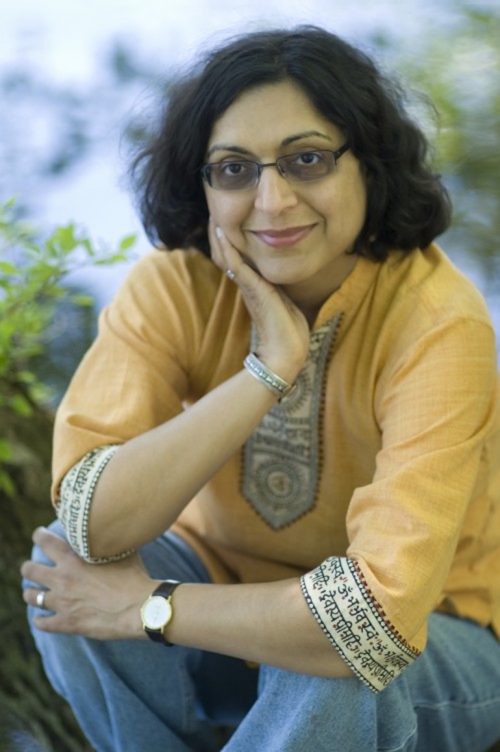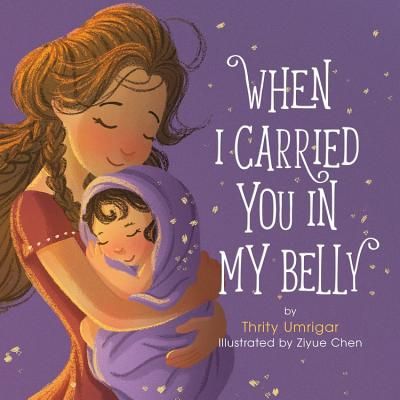Local author and professor Thrity Umrigar sat down with us recently to discuss the writing of her first children’s book, When I Carried You in My Belly, and other topics.
She also told us a bit about her upcoming event at Lee on Sunday, September 23 at 2 p.m., which kicks off our new “Meet the Author” series for kids. Check out the interview below, and be sure to join Thrity on September 23rd!
You’re best known for writing emotionally powerful books aimed at adult readers. What inspired you to write a children’s book?
I wrote When I Carried You in My Belly on a plane flight – it was a very turbulent flight, and to distract myself I took my airplane napkin and wrote out the entire book in 20 or 25 minutes, unfolding it and finding every white space I could possibly write on. So the actual writing of the book happened very quickly. But in terms of the conception of the book, and thinking about what this book is about, it’s a topic that’s very near and dear to my heart. We often hear all this rhetoric of “spare the rod and spoil the child,” discipline and punishment, and I just don’t believe in that. In all my years I haven’t come across an adult who, because they got an excess of love as a child, grew up to be a not-so-nice person. In fact, I believe exactly the opposite is true. And this isn’t rocket science, but I think that parents for understandable reasons sometimes forget that. So I just wanted to write this very affirming book that makes children feel loved and valued, and explains to them the importance of not just love but also playfulness, delighting in nature, having grandparents dote on them, all of those things.
How did the experience of writing this book differ from writing a novel? Can you describe the process of collaborating with illustrator Ziyue Chen?
So this habit that I have of writing on the back of napkins is carried over from writing novels. I often spend long plane flights doing this – it seems like one of the few spots left in modern life where there aren’t too many interruptions. So the act of that was not unusual. But once the book was done and sold, and the collaboration with the illustrator began, that was just a terrific experience for me. You know, when you’re writing novels for adults, it’s a very solitary and occasionally even lonely pursuit. It’s just you and a room and your computer. But in this case, there were all these other people, and this very creative young woman [Ziyue Chen]. She’s based in Singapore, so I’ve never met her face to face, but when my publisher sent me illustrations by three different artists and asked me to choose one for this book, she was hands down my favorite. I just knew that her sensibility would be able to draw out what was in my words. It was a very interesting collaboration and a completely new experience for me, and one that I hope to repeat. I just sold my second picture book to Scholastic and hopefully the same process will happen again.
You used to write for the Akron Beacon Journal. What motivated you to move away from journalism and pursue fiction in recent years? Do you feel fiction writing offers certain possibilities that aren’t available in journalism?
I loved all of my years in journalism. I thought it was truly a privilege and an honor to be allowed into people’s homes, to be allowed into people’s lives, where they would share the most personal and intimate details of their lives with me. And then to be a conduit and be able to share that story with the world, I never got used to that feeling of privilege. I loved doing that and I did it for a long time. But as the years wore on, I realized that I had my own stories inside me that I really wanted to share. And for someone like me, the only downside to journalism is of course that you can’t make things up, you are restricted in whatever your sources tell you.That’s what you’re going to report. And I’m a pretty opinionated person and I felt like I had all of these stories inside me that were not getting told, so I just decided to write a book. At the time, I was working full time at the Beacon, I was going to school part time to earn a PhD in English at Kent State, and every time I would read a great book for one of my classes, it would make me just want to come home and sit down and work on my own novel. So things got to a point where it was too much, and I just couldn’t juggle all three things any longer. So I set the novel aside and finished my dissertation. And I knew I needed an expanse of time – I was being pulled in too many directions and the novel deserved more than I was able to give it – so I applied to a fellowship for journalists. It’s called the Nieman Fellowship. I was terribly lucky and I got that fellowship on my first try. So what I did when I moved to Cambridge was, I would just get up really, really early in the morning and I would write for as long as I could then get dressed and go to school for the day. I did that for several months, and then, again by sheer dumb good luck, happened to connect with a woman who was a literary agent, and she liked my work. By the time I came back to Ohio 10 months later, I had a book contract, and that’s how my career as a novelist began.
Speaking of getting up early in the morning to write, do you have a typical writing process, or a certain place or time of day that’s most ideal for writing? Do you believe it’s important for writers to stick to a regular writing habit?
Let me tackle the last question first. Yes and no. In a dream world it would be fabulous to dedicate a certain block of time to writing, preferably the same time every day, and just write for those hours. The reality is most people’s lives are just too complicated and complex for that to be possible. So my advice to writers is, if you can do that – if you can set some time aside to write every day, then by all means do so. But if you can’t, you still have 10 minutes a day, you still have 15 minutes a day – you can still sacrifice watching your favorite TV show when the rest of your family is doing that and you can go to another corner of your home and write for a half hour maybe. Not having time is not a good enough excuse for not writing. It’s no different from going to the gym – you know how some people say, “Oh, I’d love to go exercise, I just don’t have the time!” – well I remember very vividly that President Obama, while he was in the White House, used to routinely get up at 4:30 or 5 in the morning and work out for an hour. So if the President can do it, there’s no excuse for the rest of us. I always tell people, “Guess how many hours in a day I have? I have 24 hours too, exactly the same number of hours that you are given.” If you’re not enjoying it, don’t do it! But if you have a story in you that is dying to come out, try and figure out a way to do it.
Even if that means writing on napkins.
Even if that means writing on the back of your hand. Or on your forehead. Just write!
With that being said, do you have a typical routine?
The honest answer is yes, I used to. For several of my books, as I mentioned earlier, I would get up at 4:30 or 5 in the morning and write, and then, you know, teach full time at Case Western Reserve in Cleveland. To be perfectly honest with you, in my last few books that has not always been possible for all kinds of reasons. Most likely because I am getting lazier and lazier and can’t get myself to get up at 4:30 in the morning to write all the time. But I do think that that’s sort of the magical hour. I think coming to a blank computer screen with your mind fresh before all the emails and the pings and the pongs of modern life take over is probably the ideal way to write. Or late into the night. Apart from that, I just write when I can. I catch a 15-minute chunk of time here and another half hour there; if I have office hours and my student is late in arriving, I might get three lines written, but those are three lines that I might not otherwise have gotten down. There is no formula. What works for one writer might not work for someone else. People have aging parents, people have young children – there are all kinds of demands on people’s lives. Again, it just comes down to how passionately you feel. You know, when people always talk about the heavy lifting of writing and how difficult it is, writers often forget to mention what a joyous thing it is to just sit down and write. And if you are not feeling that kind of joy, then go find something that gives you that kind of joy.
In addition to being a bestselling author, you’re also a teacher. You write on your CWRU faculty page that you “think of writing and teaching as part of the same continuum and believe that [your] writing informs [your] teaching as well as the other way around.” Can you say more about how these two professions interact for you?
Well, I teach writing, so whatever skills I might acquire by repeatedly working on books, or whatever techniques I might discover for myself, these are things that I can then carry into the classroom and share with my students. The flipside of that is I am forever encouraging them to discover their own path and their own voice and what fits them; it’s clear that what works for me may very well not work for twenty-something-year-old college students. But on the most basic level, whatever I’m reading and writing in any given moment is carried into the classroom and offered to my students. But in a slightly more mystical sense, if that’s the right word for this, both teaching and writing are performances. When you teach, you are enacting something, you are performing something, and the exact same thing happens on the page. Even when you write a first person account of something, it’s not you. Even if you’re writing a memoir and telling your own story, the minute you give voice to your story it becomes a kind of performance. You become an actor enacting your own story. In those ways I see parallels between the two professions.
You have an event coming up at our Lee Road branch on Sunday, September 23 at 2pm. Can you tell me what you have planned for that?
You know, it depends on who the audience is. I’m hoping there are tons and tons of kids there, because what I would love to do with their help is read my book to them and answer any questions they may have for me. I’m mostly hoping it’s just one big love fest where I can take the message of this book, which is positive and affirming, and frankly just make them feel good about themselves, make them feel wanted, and make them realize that even before they were born there was such anticipation for their arrival, and so many people were excited to welcome them into the world. So if one kid leaves there feeling that way, gosh, what better way to spend a Sunday afternoon?
We couldn’t agree more!
For more information on Thrity’s upcoming event at Heights Libraries, click here.
To check out When I Carried You in My Belly and other works by Thrity from our catalog, click here.
Finally, excerpts of this discussion were recently aired on Biblio Radio — click here to listen to the segment.


